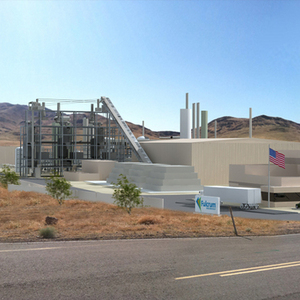USDA awards loan guarantee to Fulcrum Sierra Biofuels

Fulcrum Bioenergy
September 4, 2014
BY Erin Krueger
The USDA has awarded a $105 million loan guarantee to Fulcrum Sierra Biofuels LLC to support the development of an 11 MMgy facility to convert municipal solid waste (MSW) into jet fuel. The $266 million project is planned for development near Reno, Nevada.
The loan guarantee is being made under the USDA’s Biorefinery Assistance Program through the Bank of America N.A. According to the USDA, the award represents the first loan guarantee it has made to a biobased jet fuel project.
With the loan guarantee now in place, Rick Barraza, vice president of Fulcrum Bioenergy, said the project is essentially fully funded and ready to begin construction. Construction activities are currently expected to begin later this year. According to Barraza, the facility is expected to in commercial production by the end of 2016.
Feedstock agreements are already in place for the Sierra Biofuels facility and future Fulcrum plants, Barraza continued, noting the company has contracts in place with both Waste Management and Waste Connections to provide a 20-year supply of MSW. That feedstock will come to Fulcrum at zero cost.
Advertisement
"This represents a huge step forward in the development of clean, renewable, job-creating American fuels," said Agriculture Secretary Tom Vilsack. "The nation is entering a new energy age that will make us more energy independent, cut carbon pollution and strengthen our economy, especially in rural communities where clean fuels will be produced."
At the proposed facility, Fulcrum will produce syntheses gas from 147,000 tons of MSW and catalytically convert it to synthetic paraffinic kerosene/jet fuel through a proprietary technology. The company’s website explains its process begins with the gasification of the organic materials in MSW feedstock to syngas, which consists primarily of carbon monoxide, hydrogen and carbon dioxide. The resulting syngas is purified and put through a Fischer-Tropsch process to produce a syncrude, which can then be upgraded to jet fuel or diesel. According to information published by Fulcrum, the gasification system used in the process has been licensed from ThermoChem Recovery International Inc., while the Fischer-Tropsch process is a well-established technology that has been used in commercial applications for decades. During the final step of the process, syncrude is upgraded using hydrotreating, hydrocracking and hydroisomerization steps.
Fulcrum Bioenergy has been active in the advanced biofuels space for several years. In 2009, the company announced it had successfully demonstrated the conversion of MSW into ethanol. The following year, the company announced plans to develop a 10.5 MMgy MSW-to-ethanol facility. The company has since changed its focus to biobased jet fuel and diesel. In 2011, Fulcrum filed a registration statement with the U.S. Securities and Exchange Commission for a proposed initial public offering, but withdrew that registration statement in late 2012. In May 2013, the company announced it successfully demonstrated the conversion of MSW to jet and diesel fuels.
In August, Cathay Pacific Airways announced an investment in Fulcrum as part of its biofuel strategy and to help it achieve a target of carbon –neutral growth from 2020. Cathay also negotiated a long-term supply agreement with Fulcrum for an initial 375 million gallons of sustainable aviation fuel over 10 years. On an annual basis, that represents approximately 2 percent of the airlines current fuel consumption. At that time, the companies indicated Fulcrum intended to commence construction on its first commercial project later this year.
Advertisement
The USDA could announce the award of additional loan guarantees to separate biorefining projects soon. Within its statement announcing the Fulcrum loan guarantee, the USDA also noted it is negotiating three additional loans for biorefineries in Iowa, North Carolina and Oregon. The USDA said those loans would provide financing to produce renewable fuels from woody biomass, municipal solid waste and energy grasses. One of those ventures aims to retrofit an existing corn ethanol plant to produce cellulosic ethanol.
The Biorefinery Assistance Program was established in the 2008 Farm Bill and reauthorized and extended in the 2014 Farm Bill. The 2014 bill expanded the program to include biobased renewable chemicals and biobased product manufacturing. The USDA said its staff is working on regulations to set forth upcoming application terms for additional loan guarantees under the program.
USDA awarded the first loan guarantee under the program in 2009 to Sapphire Energy in New Mexico. Sapphire has already paid of its $54.5 million loan guarantee. The program’s current portfolio includes a $12.8 million loan to the Fremont Community Digester in Michigan, and a $75 million loan to Ineos New Planet Bioenergy in Florida. Both awards were made in 2011.
Related Stories
Broco Energy on July 17 announced a new partnership with the Massachusetts Port Authority (Massport) to deliver and transition Massport's fuel tanks to renewable diesel across its various facilities.
Shell Aviation, Accenture, and Amex GBT on July 10 announced Avelia is in the process of evolving to an industry solution with independent data hosting and a multi-supplier model helping users access the GHG benefits of SAF.
The U.S EPA on July 17 released data showing more than 1.9 billion RINs were generated under the RFS during June, down 11% when compared to the same month of last year. Total RIN generation for the first half of 2025 reached 11.17 billion.
The U.S. EPA on July 17 published updated small refinery exemption (SRE) data, reporting that six new SRE petitions have been filed under the RFS during the past month. A total of 195 SRE petitions are now pending.
European biodiesel producer Greenergy on July 10 confirmed plans to shut down its biodiesel plant in Immingham, Lincolnshire, U.K. The company temporarily suspended operations at the facility earlier this year.
Upcoming Events










